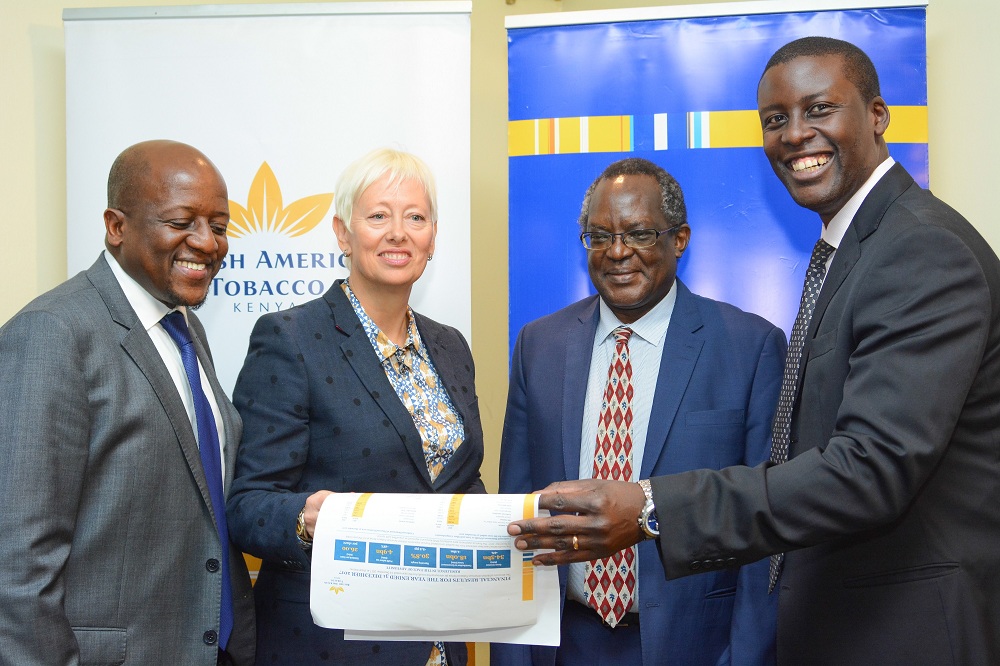British American Tobacco Kenya (BAT Kenya)’s net profit for the full year ended December 31, 2017, shrank 21.2% as a result of reduced sales both in Kenya and overseas markets.
The cigarettes manufacturer reported a net profit of Ksh 3.3 billion compared to Ksh 4.2 billion realised in 2016. Gross revenue declined 6% to Ksh 34.4 billion. The company said it so far contributed Ksh 18 billion to government revenue in form of taxes.
According to the company’s board chairman George Maina , the results were a reflection of a resilient performance in an adverse trading environment.
“The company navigated an unexpectedly difficult trading environment in Kenya and across our exports markets,” he said in a statement.
Commenting on the results, Beverley Spencer – Obatoyinbo, Managing Director of BAT Kenya,
said: “In the domestic market, we grew market share despite the adverse impact of excise-led price increases on the sales mix. Our global drive brands continue to record a strong performance. We remain a key player in Kenya’s economy through our tax contributions standing at Ksh 18 billion in the form of Excise Duty, Value Added Tax (VAT), Pay as You Earn (PAYE) and Corporation Tax.”
She said the Nairobi factory remains a manufacturing hub for the company’s operations with over 60% of our production being exported to over 13 countries in the region. In 2017, the export business generated USD 89 million for the Kenyan economy, solidifying our position as a top foreign exchange earner.
Sidney Wafula , BAT Kenya Finance Director, said: “The company’s financial performance reflects the impact that the difficult operating environment has had on our business. Net revenues were down 6% leading to lower profits and cash generation. As a consequence, we had higher borrowings and financing costs. However, we proudly maintained our focus on working capital management, delivering strong productivity savings of over Ksh 700 million while containing our cost base to mitigate some of the inflationary cost increases.”
“We continue to see the benefits of embedding more efficient ways of working using technology as an enabler, which regrettably has led to a reduction in headcount, but puts us in a good position to be more competitive into the future,” added Wafula.
Commenting on the impact of excise-led pressures on the business, Simukai Munjanganja, Head of Legal & External Affairs said: “The tobacco industry is currently incurring per unit costs on excise tax stamps, which are 87% higher than those being incurred by manufacturers of similar excisable products. For us, this translates to an unjustified and unsustainable Ksh 350 million increase in the annualised cost of compliance. While we appreciate the critical role tax stamps play in authenticating duty paid products, tax stamps should not come at a significant cost to the manufacturer or become a revenue generating measure, as the current cost appears to be.”
He said this was recognised in the accompanying policy statement that clearly stated that the cost of excise stamps would be proportionate to the value of the products.
“We continue to raise our concerns, to the relevant arms of government, about the adverse and disproportionate impact of this measure,” Munjanganja added.
READ: Why State House is unhappy with KBC
Going forward, Spencer – Obatoyinbo said they will continue to invest in a fit for future portfolio and enhance the competitiveness of the company’s factory to deliver sustained value for its shareholders.
Shareholders in the Nairobi Securities Exchange-listed company are set to receive a total dividend of Kshs 26 per share.
BAT Kenya currently employs 400 permanent employees and has contributed to Kenya’s economy growth through a continued systematic year-on-year investments in the past five years, pumping in over Ksh 5 billion into tobacco farming and processing and a green leaf threshing plant in Thika.













Leave a comment